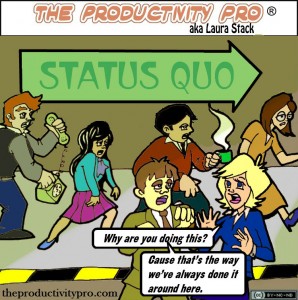“Any business today that embraces the status quo as an operating principle is going to be on a death march.” ― Howard Shultz, Chairman and CEO of Starbucks.
Here is the weekly roundup of activity from Laura Stack’s blog, columns, podcast, and other featured articles. Scroll down to read the complete roundup of productivity resources to help you create Maximum Results in Minimum Time.
This week on the Blog
Wait a Minute Here: Promoting a Team Culture That Questions the Status Quo
 Let’s face it: most of the time, we want our work lives to run smoothly… and that’s much easier to accomplish when you complete the tasks your manager asks of you. But decent leaders don’t want yes-women and yes-men. In this age of required flexibility and agility, most leaders have learned to listen when workers offer new ideas—even people who challenge the established status quo. ( <–CLICK TO TWEET)
Let’s face it: most of the time, we want our work lives to run smoothly… and that’s much easier to accomplish when you complete the tasks your manager asks of you. But decent leaders don’t want yes-women and yes-men. In this age of required flexibility and agility, most leaders have learned to listen when workers offer new ideas—even people who challenge the established status quo. ( <–CLICK TO TWEET)
One company famous for deliberately inviting its people to attack the status quo is well known for not just questioning but shattering and redefining the status quo, in fact, I hesitate to bring it up at all, because it’s overused: the shoe vendor Zappos. But I can’t help myself as a loyal customer. CEO Tony Hsieh’s approach to business in general and leadership in particular have proven so wonderfully weird, and weirdly effective, I can’t just ignore it. Aside from bribing brand new employees with cash bonuses to quit as a test of their commitment—and calling executives “monkeys”—Hsieh has recently reorganized the company into a “holacracy” consisting of interacting business circles with no real leaders. This gives the rank-and-file more of a say in how the company’s run, and helps it avoid bureaucratic rigidity. There’s no telling how long this will continue, since Amazon acquired the company in 2009; but so far it still gets to function independently—and, more importantly, profitably.
How Tony Hsieh’s approach can work for you
While you probably won’t take it as far as Hsieh, his approach offers an effective way to keep your team slightly off-balance at all times. In this new Flexibility Era, we all need to be willing to strike off in a new direction suddenly, or turn on a dime, or even rev in reverse. Changes needn’t come so hot and heavy no one ever has time to catch their breath, if we’re always seeking it as a company and as a team. What would happen if we are constantly willing to question how things are done? Not necessarily make constant changes but be open to them.
We often forget that “best practices” can’t be static. What has worked best for years suddenly isn’t productive anymore. Building cars that ran best on leaded gas, for instance, became worst practice when oil companies stopped adding ethyl lead to gasoline due to regulatory pressure in the 1970s. More to the point for white-collar workers, technology advances so fast that best practices may change several times a year. (I bet some of you reading this can remember when punch cards were best practices for computer programming.)
Intuit, the company that makes Quickbooks, Quicken, and TurboTax, is less well known than Zappos for its questioning of status quo. But like Zappos, it has challenged itself so long and so often that a status quo no longer really exists, because nothing stays the same long enough. It began as a company that made accounting software, then asked itself “Why not?” over and over, eventually expanding into tax software and home mortgage lending and rising to the top of those industries as well. A member of my virtual team recently purchased a home through Quicken Loans. It wasn’t a painless process—anyone who’s ever negotiated a mortgage knows that’s improbable—but to his great surprise, it was a fairly simple process. In fact, it finished so much quicker than expected, he was able to close on his new home a full two months before the end of his previous lease. It made for a leisurely move (although the overlapping rent and mortgage payments hurt a bit).
According to a 2014 Harvard Business Review article, Brad Smith, President and CEO of Intuit, searches for what he calls “golden questions” he uses to define a new “Grand Challenge.” These questions vary according to the project, whether it’s how to create a finished tax return in 10 minutes (now answered with the smartphone based SnapTax app) or how to become the top home mortgage lender in the country.
It’s worth the effort to do the same yourself. When you decide how you want to challenge your company’s status quo, wherever you fall in the team’s hierarchy, ask yourself how to accomplish a Grand Challenge in a perfect world. If you were a superhero, how would you do it? Let’s assume you’re not; so how close can you come in the real world? Remember to keep applying new technology to the question. SnapTax started with Intuit founder Scott Cook’s determination to create that 10-minute tax return, but it wasn’t possible until years later, after Smith took over the company.
What can you do to challenge your company or team? When you become question-centric, you can find ways to test the envelope on many of the aspects of your team’s mission and vision. Even if you don’t lead the team, you certainly have some leverage on its workflow process, the projects it handles, and the tasks it solves. Ask how you can use the team’s knowledge, experience, and KSAs in new ways. Does it make sense to go all the way back to basic principles, or work around the edges to make changes? Either way can produce a more productive, supercharged team, one that adds to the bottom line at a more rapid pace than before.
No longer can we accept the same old way of doing things, even for a few years. Some futurists believe we’re fast approaching something called the Singularity, when scientific progress will be so fast and constant no one can keep up. Prepare for it now, always willing to test and question the status quo so you have contingency plans on hand for anything that might occur. Urge your teammates to do the same, so you can be ready when it comes. Don’t just question, though: offer answers that will move your team forward. If nothing else in business remains static, this does: the only thing that matters is results. Make sure you can keep producing them, come what may.
This week on LinkedIn:
From Halloween to Black Friday and Beyond: Beating the Holiday Slump
 Beware, it’s almost here: the dreaded holiday slump, when all of us are so ready for a much-needed break that productivity threatens to slip. Many of your team members will disappear for weeks at a time to visit relatives located clear across the country, and those who don’t will be so distracted by holiday planning that they might as well stay home. The result? Lagging productivity… unless of course you take up the slack. Read More on LinkedIn.
Beware, it’s almost here: the dreaded holiday slump, when all of us are so ready for a much-needed break that productivity threatens to slip. Many of your team members will disappear for weeks at a time to visit relatives located clear across the country, and those who don’t will be so distracted by holiday planning that they might as well stay home. The result? Lagging productivity… unless of course you take up the slack. Read More on LinkedIn.
In the news:
How To Keep Teamwork From Becoming Group Think – And Make Smart Decisions, Too at TLNT HR
Recommended Articles:
6 Killer Morning Moves That Can Really Turbocharge Your Work Day
Simple Time & Project Management Strategies You Can Use at Home
Podcast
Tune in this week as Laura talks about Improving Your Concentration.
© 2015 Laura Stack. Laura Stack, MBA, CSP, CPAE is an award-winning keynote speaker, bestselling author, and noted authority on employee and team productivity. She is the president of The Productivity Pro, Inc., a company dedicated to helping leaders increase workplace performance in high-stress environments. Stack has authored seven books, including her newest work, Doing the Right Things Right: How the Effective Executive Spends Time (Jan. 2016). She is a past president of the National Speakers Association, and in 2015 was inducted into its exclusive Speaker Hall of Fame (with fewer than 175 members worldwide). Stack’s clients include Cisco Systems, Wal-Mart, and Bank of America, and she has been featured on the CBS Early Show and CNN, and in the New York Times. To have Laura Stack speak at your next event, call 303-471-7401 or visit her website.


